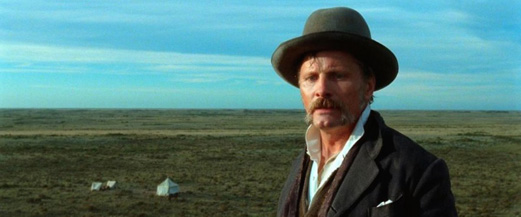Hidden Gems: Jauja
By Kyle Lee
May 30, 2018
BoxOfficeProphets.com

Jauja stars Viggo Mortensen as Danish Captain Gunnar Dinesen in 1880's Argentina, leading an engineering project in this strange land as well as working with soldiers on the eradication of the local native people. In tow is his teenage daughter Ingeborg (Viilbjørk Malling Agger), who is in love with one of the young soldiers in the group, and lusted after by one of the older soldiers. Inge and the young soldier, Corto, run off together one morning. When the Captain awakens to find his daughter gone, he sets out after her, alone. This is pretty much the extent of the traditional plot in Jauja, though it’s the beginning of when it gets most interesting. The script for the 110 minute movie was reportedly only 20 pages long. Normally you equate a page a minute from script to screen.
We are told in the opening titles that Jauja is an El Dorado-like fabled earthly paradise that many looked for, but that they always "got lost along the way." Lost could certainly fit the description of the characters, as Inge doesn't really know where she's going with Corto, and the Captain doesn't really know where he's going in looking for Inge. Lost could also describe the experience of many viewers to the approach Alonso takes as a filmmaker. In the last third of Jauja, things take an odd, and fascinating turn down the rabbit hole of surrealism, leaving many viewers lost as to what it all means, or maybe what even actually happens. Perhaps that's the "getting lost along the way" that we're told up front happens with Jauja.
The movie is very slow moving, few if any close ups, long takes, with beautifully filmed landscapes that made me feel often that it was like Taiwanese filmmaker Hou Hsiao-Hsien (a personal favorite of mine) had made a western about a man looking for his daughter. This movie definitely falls in the “slow cinema” movement typified by filmmakers like Hou, Tarkovsky, Bela Tarr and many more. Typically contemplative movies that are meant to be thought provoking, often tackling themes and providing images that stick with you long after the credits roll.
In the lead role of Captain Dinesen, Viggo Mortensen gives one of his best performances (he also worked as a producer and arranged the very sparse, but gorgeous, score). Speaking both Danish and Spanish, Mortensen has such command over his body language and the way he's presenting himself that although there isn't a ton of dialog in the movie, we're never left wondering where the Captain is emotionally. He’s a fish out of water, wearing his Danish military uniform and almost aimlessly wandering the Argentinian countryside. It’s almost comical in a way, like a Danish Don Quixote tilting at the windmills (but it’s his missing daughter instead), which I’m sure was intentional to a certain degree from the filmmakers.
It's also remarkable to think of how many languages Mortensen has now spoken on screen. By my tally he's spoken English, Spanish, Danish, French, Russian, Arabic, and the fictional language of Elvish. I’ve also seen him gives a speech in Italian, though I’m not sure he’s ever spoken it in a movie. This is terrific work from one of our best actors, who we haven't seen enough of lately. One of the reasons we haven’t seen him as much is because he works internationally like in this movie. He’s not confined to work in America, or just in English speaking countries. Jauja makes me want to seek out some of that international work that Mortensen has done because I was enthralled with this movie.
We know from the opening scene (all done in one static shot, another marker of the slow cinema movement) that Inge wants a dog, so when the Captain runs across a dog late in his quest and he follows it, where is the dog leading him? Why does he trust the dog? At first I thought it was a case of “if this dog can survive out here, there must be food and fresh water nearby, and I need those things”, but when the Captain gets to where the dog leads him, where is he? We meet an old woman, who speaks to Dinesen as though she knows him. Who is this Danish speaking old woman in the middle of the Argentinian desert? How is she who we think she is? IS she who we think she is (she can’t be, right?)?
In Norse mythology Hell is presided over by a woman and her dog. Is this Hell? Is the Captain searching through Purgatory, unaccepting of returning to see the woman? You might think that the coda to the film will answer some of the questions, but instead it just brings up more. Was this a dream? Whose dream was it? I don’t think it was a dream, I tend to reject any “it was a dream” scenario in an open ended movie like this. I think it was more of a metaphysical time loop or something (“it was a dream” is too lazy for this remarkable of a movie). But then what is happening? And who is it happening to?
What kind of western ever gets us to ask these kinds of questions? One of the greatest, that's what kind. A true Hidden Gem.